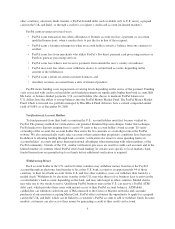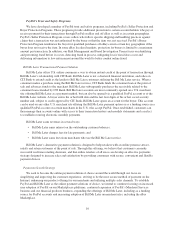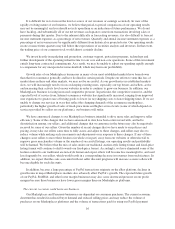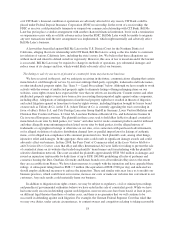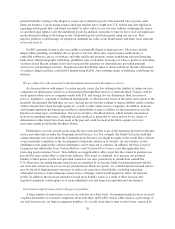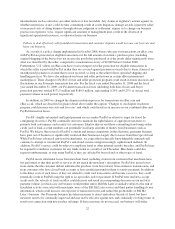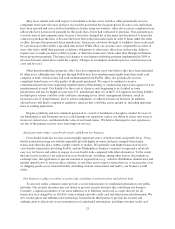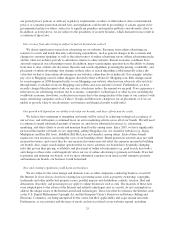eBay 2009 Annual Report Download - page 26
Download and view the complete annual report
Please find page 26 of the 2009 eBay annual report below. You can navigate through the pages in the report by either clicking on the pages listed below, or by using the keyword search tool below to find specific information within the annual report.or if CIT Bank’s financial condition or operations are adversely affected for any reason, CIT Bank could be
placed under Federal Deposit Insurance Corporation (FDIC) receivership. In the event of a receivership, the
FDIC as receiver could potentially terminate or suspend our commercial relationship with CIT Bank. Bill Me
Later has put in place a similar arrangement with another chartered financial institution, but if such a termination
or suspension occurs with no or little advance notice from the FDIC, Bill Me Later would be unable to originate
any new transactions until the new arrangement was implemented, which might materially and adversely affect
Bill Me Later’s business.
A lawsuit has been filed against Bill Me Later in the U.S. District Court for the Northern District of
California, alleging that in its relationship with CIT Bank, Bill Me Later is acting as the true lender to customers
in violation of various California laws, including the state’s usury law. We believe that these allegations are
without merit and intend to defend ourselves vigorously. However, this area of law is uncertain and if the lawsuit
is successful, Bill Me Later may be required to change its methods of operations, pay substantial damages and
reduce some of its charges and fees, which would likely adversely affect our business.
The listing or sale by our users of pirated or counterfeit items may harm our business.
We have received in the past, and we anticipate receiving in the future, communications alleging that certain
items listed or sold through our service by our users infringe third-party copyrights, trademarks and trade names,
or other intellectual property rights. See “Item 3 — Legal Proceedings” below. Although we have sought to work
actively with the owners of intellectual property rights to eliminate listings offering infringing items on our
websites, some rights owners have expressed the view that our efforts are insufficient. Content owners and other
intellectual property rights owners have been active in asserting their purported rights against online companies,
including eBay. Allegations of infringement of intellectual property rights have resulted in threats of litigation
and actual litigation against us from time to time by rights owners, including litigation brought by luxury brand
owners such as Tiffany & Co. in the U.S. (where Tiffany & Co. is currently appealing the trial court ruling in
favor of eBay), Rolex S.A. and Coty Prestige Lancaster Group GmbH in Germany, Louis Vuitton Malletier and
Christian Dior Couture in France, L’Oréal SA, Lancôme Parfums et Beauté & Cie, and Laboratoire Garnier &
Cie in several European countries. The plaintiffs in these cases seek to hold eBay liable for alleged counterfeit
items listed on our sites by third parties, for “tester” and other not for resale consumer products and for unboxed
and other allegedly nonconforming products listed on our sites by third parties, for the alleged misuse of
trademarks or copyrights in listings or otherwise on our sites, or in connection with paid search advertisements,
or for alleged violations of selective distribution channel laws or parallel import laws for listings of authentic
items, or for alleged non-compliance with consumer protection laws. Such plaintiffs seek, among other things,
injunctive relief and damages. In the aggregate, these suits could result in significant damage awards and could
adversely affect our business. In June 2008, the Paris Court of Commerce ruled in the Louis Vuitton Malletier
and Christian Dior Couture cases that eBay and eBay International AG were liable for failing to prevent the sale
of counterfeit items on its websites that traded on plaintiffs’ brand names and for interfering with the plaintiffs’
selective distribution network. The court awarded the plaintiffs approximately EUR 38.6 million in damages and
issued an injunction (enforceable by daily fines of up to EUR 100,000) prohibiting all sales of perfumes and
cosmetics bearing the Dior, Guerlain, Givenchy and Kenzo brands over all worldwide eBay sites to the extent
they are accessible from France. We have taken measures to comply with the injunction and have appealed these
rulings. A subsequent ruling fined us EUR 1.7 million (the equivalent of EUR 2,500 per day) and indicated we
should employ additional measures to enforce the injunction. These and similar suits may force us to modify our
business practices, which could lower our revenue, increase our costs or make our websites less convenient to our
customers. Any such results could materially harm our business.
In addition to litigation from rights owners, we may be subject to regulatory, civil or criminal proceedings
and penalties if governmental authorities believe we have aided in the sale of counterfeit goods. While we have
had some early success in defending against such litigation, more recent cases have been based, at least in part,
on different legal theories than those of earlier cases, and there is no guarantee that we will continue to be
successful in defending against such litigation. For example, the German Federal Supreme Court has ruled that
we may owe duties, under certain circumstances, to content owners and competitors relating to taking reasonable
18



